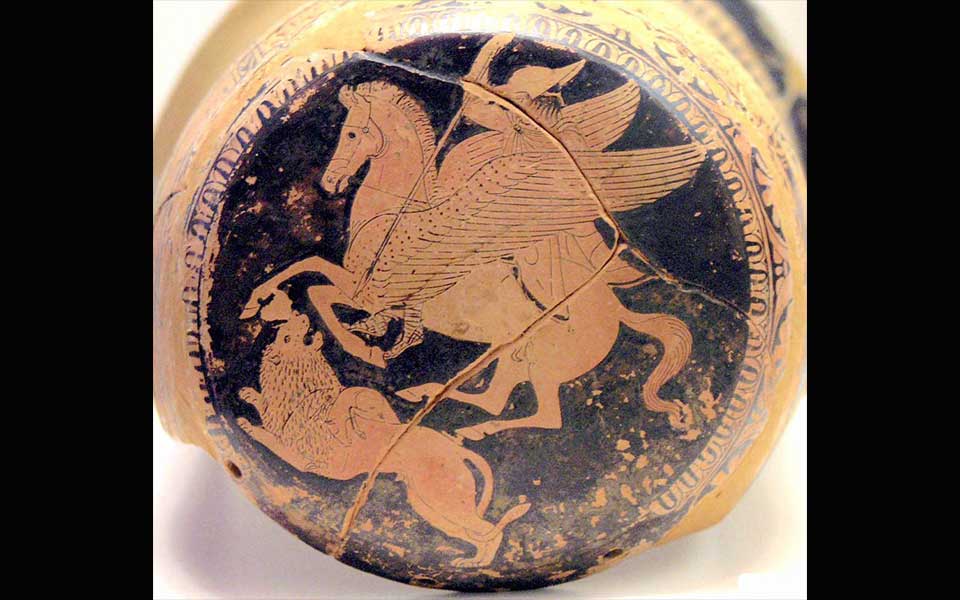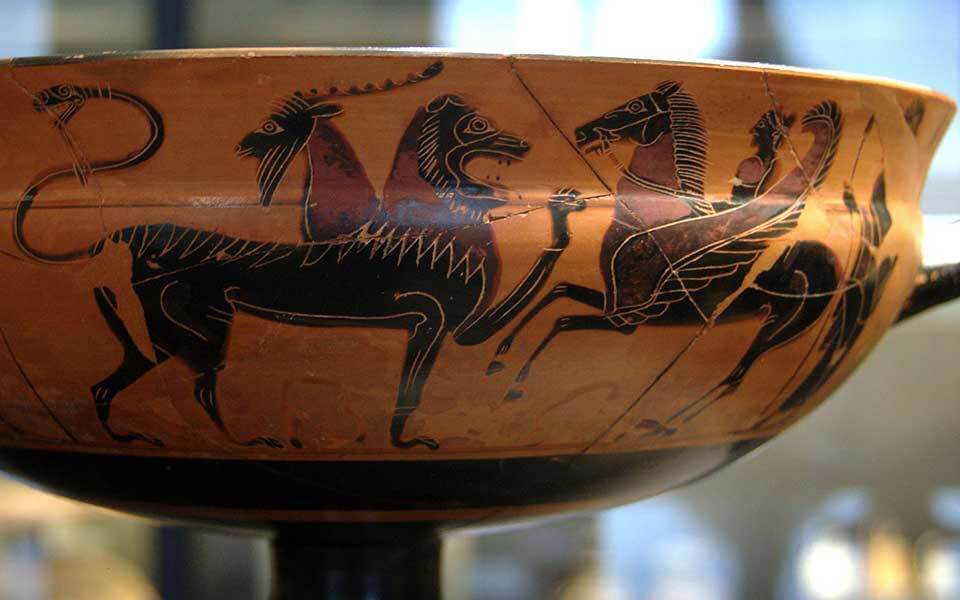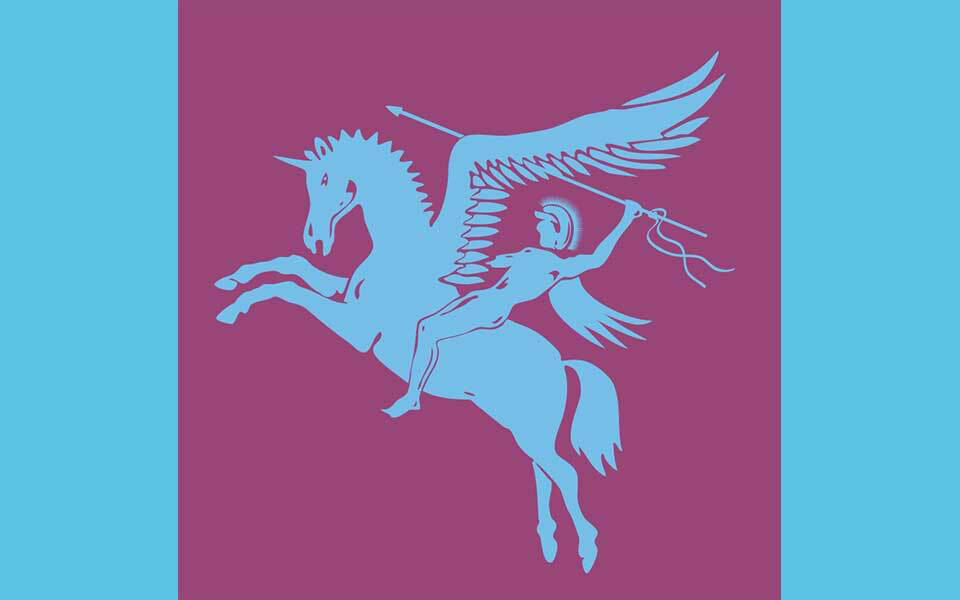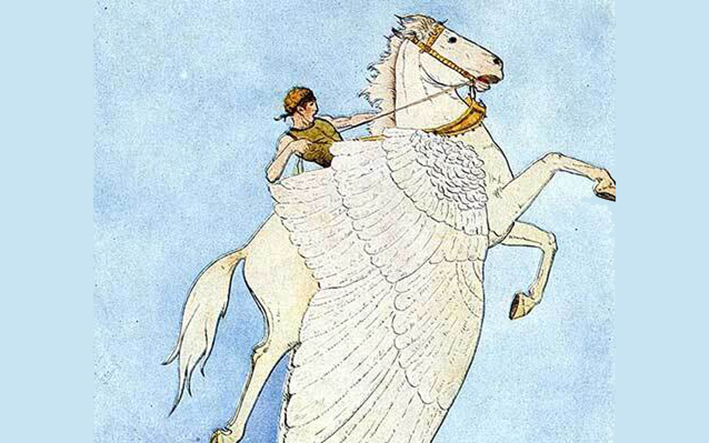Hands up if you’ve heard of Bellerophon. Not immediately obvious? Fret not. It’s fair to say that he doesn’t enjoy the same level of recognition as the likes of Heracles, Jason or Theseus in the vast, disorganized corpus of Greek mythology, but, to the ancients, Bellerophon was a hugely popular figure – up there in the “premier league” of monster slayers.
You certainly would have heard of his winged equine companion, Pegasus, and you may have even come across his fearsome quarry, the Chimera, a monstrous fire-breathing hybrid with the head of a lion, the body of a goat, and the tail of a snake (in some versions of the myth, she had three heads: one of a lion, one of a she-goat, and one of a powerful serpent). Ring any bells?
While Medusa-slaying Perseus is perhaps more famously associated with the story of Pegasus (a tradition developed by later Classical writers and popularized in medieval literature), the hero to first tame and befriend the winged horse was in fact Bellerophon, son of Poseidon, god of the sea, and Eurymede, wife of Glaucus, king of Corinth.
Bellerophon’s exploits appear in multiple ancient texts, inlcuding Homer’s Iliad, Hesiod and Pindar, and was even the eponymous hero in a lost play by the late-5th century BC Athenian tragedian, Euripides.
His story, full of the usual mix of high adventure, inlcuding a run-in with a band of bloodthirsty pirates, could be described as an early Greek version of a morality play: in the bloom of youth, his piety and heroic actions won him the favor of the gods, but his pride and arrogance got the better of him and led to his sudden, ignominious fall.

© Marsyas
Bellerophon tames Pegasus
Bellerophon’s story starts in Corinth where he has inexplicably killed a close family member (a brother?) and is forced into exile by his mortal father, Glaucus. He flees to Argos and the court of king Proteus for ritual purification, where queen Antinea falls in love with him at first sight.
Rejecting her advances, she falsely accuses Bellerophon of trying to seduce her. Not wanting to incur the wrath of the Furies (female deities of vengeance) by murdering a suppliant, Proteus sends him off to Antinea’s father Iobates, king of Lycia in Asia Minor, with a sealed letter, which read, in no uncertain terms: “get rid of the bearer.”
Equally loathed to attract the unwanted attention of the Furies by killing a royal guest, king Iobates sets Bellerophon the seemingly suicidal task of killing the ferocious Chimera, which happens to be terrorizing the local countryside.
Before setting out on his quest, Bellerophon consults a local seer, who advises him to catch and tame the divine “Moon-horse” Pegasus to aid him in his task. He finds Pegasus drinking from a well on the Acropolis of Corinth, where he throws over his neck a magical golden bridle, a gift from his goddess-protector Athena (in another version, his divine father Poseidon presents him with the horse).

© Heidelberg Painter
Slaying the Chimera, and other quests
Bellerophon, now riding on Pegasus’s back, returns to Lycia in search of the Chimera, intent on slaying the beast. However, the monster’s fiery breath prevents the hero and his winged companion from getting close enough to deliver the killing blow.
Circling overhead and riddling the creature’s back with a hail of arrows, Bellerophon resorts to fixing a lump of lead to the end of his spear, thrusting it between her jaws, where it melts and runs down her throat.
Far from rewarding Bellerophon for purging his kingdom of the dreaded Chimera, Iobates, still intent on getting rid of the hero, sends him on another suicidal quest; this time to conquer the warlike Solymians and their allies, the Amazons, a tribe of fearless women warriors.
Riding Pegasus into battle once again, he easily defeats them by staying out of range of their arrows and dropping large boulders on their heads.
And so it continues, until Iobates, realizing his folly (and that Bellerophon is no ordinary man) sues for peace and begs for forgiveness.

The great fall
At the height of his fame and fortune, Bellerophon presumptuously believes his rightful place is among the gods on Mount Olympus. Riding up to heaven, Zeus, angered by his arrogance, sends a gadfly to sting Pegasus, causing the horse to rear and fling Bellerophon back down to earth.
Pegasus nevertheless continues the journey to Olympus, where Zeus put him to use as a pack-horse for his thunderbolts. Bellerophon on the other hand, fallen from grace, landed heavily on a thorn bush. Crippled and blinded, he wandered the earth of rest of his life, miserable and alone.
Despite Bellerophon’s sad ending, he is a fascinating, albeit cautionary figure in Greek mythology. For the ancients, the story of how Zeus humbled the hero was no doubt told as a moral anecdote to discourage revolt against the Olympian religion, but the everlasting image of him darting across the sky on the back of Pegasus and slaying the Chimera remained a popular image. It is interesting to note that the mythological etymology of Bellerophon’s name means “Wielder of Missiles.”
In keeping with the motif of dealing “death from above,” the emblem of Bellerophon riding Pegasus was famously adopted by British airborne forces during World War II. Scenes of British and Commonwealth paratroopers landing in Nazi-occupied Europe following the D-Day Landings conjure up the story of the mythological Greek hero slaying the fire-breathing beast. The emblem is still used today as the insignia of the British Army’s rapid reaction force, 16 Air Assault Brigade.











